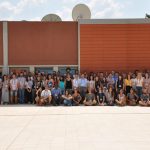 Space travel has been in the news recently with the last space shuttle flight on the 8th July 2011 (http://www.bbc.co.uk/news/science-environment-14063682). The ending of the operational space shuttle era which has lasted almost thirty years after its development has led to recent discussions concerning the future of NASA funding and space flight and research from national and international collaboration perspectives.
Space travel has been in the news recently with the last space shuttle flight on the 8th July 2011 (http://www.bbc.co.uk/news/science-environment-14063682). The ending of the operational space shuttle era which has lasted almost thirty years after its development has led to recent discussions concerning the future of NASA funding and space flight and research from national and international collaboration perspectives.
Here in the UK the European Space Agency (ESA) has a technology centre in Harwell headed by Martin Ditter. He explained the rational of the ESA UK location and the relationship with technology and research (http://www.theengineer.co.uk/in-depth/interviews/martin-ditter-of-esa-uk-harwell-research-centre/1000835.article).
In terms of enterprise ESA have recently opened a Business Incubation Centre to utilise mature space technologies to create opportunities within other business sectors. In addition Research Council, EU and KTP priorities include space as a preferred area. Other activity includes the UK Space Agency established in April 2011 as part of the Department for Business Innovation and Skills.
At an educational level Space is identified a key subject area to enthuse young people and stimulate STEM subject interest. Space technology has a university undergraduate and master’s level presence at several universities linked with engineering studies such as electronics, aerospace, robotics and mechanical. Other related opportunities such as space tourism (http://www.virgingalactic.com/) will only increase public activity and interest in Space.
This could be an opportunity for HEI’s to develop niche research areas related to space.
 BU Research Associate selected for European Space Agency Summer School
BU Research Associate selected for European Space Agency Summer School










 Fourth INRC Symposium: From Clinical Applications to Neuro-Inspired Computation
Fourth INRC Symposium: From Clinical Applications to Neuro-Inspired Computation ESRC Festival of Social Science 2025 – Reflecting back and looking ahead to 2026
ESRC Festival of Social Science 2025 – Reflecting back and looking ahead to 2026 3C Event: Research Culture, Community & Cookies – Tuesday 13 January 10-11am
3C Event: Research Culture, Community & Cookies – Tuesday 13 January 10-11am Dr. Chloe Casey on Sky News
Dr. Chloe Casey on Sky News Final Bournemouth University publication of 2025
Final Bournemouth University publication of 2025 ECR Funding Open Call: Research Culture & Community Grant – Application Deadline Friday 12 December
ECR Funding Open Call: Research Culture & Community Grant – Application Deadline Friday 12 December MSCA Postdoctoral Fellowships 2025 Call
MSCA Postdoctoral Fellowships 2025 Call ERC Advanced Grant 2025 Webinar
ERC Advanced Grant 2025 Webinar Horizon Europe Work Programme 2025 Published
Horizon Europe Work Programme 2025 Published Update on UKRO services
Update on UKRO services European research project exploring use of ‘virtual twins’ to better manage metabolic associated fatty liver disease
European research project exploring use of ‘virtual twins’ to better manage metabolic associated fatty liver disease